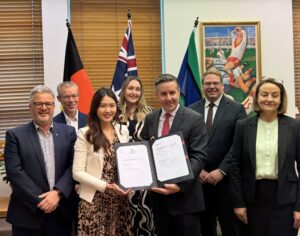PSA welcomes 8th Community Pharmacy Agreement, and enters into Strategic Agreement on Pharmacist Professional Practice
3 June 2024

The Pharmaceutical Society of Australia (PSA) welcomes the announcement today that the Australian Government and Pharmacy Guild of Australia has finalised the 8th Community Pharmacy Agreement. PSA welcomes the certainty the 8CPA brings to the community pharmacy sector, and confidence it brings to the viability of Australia’s community pharmacies.
For the last 12 months, the community pharmacy sector has had uncertainty. The 8CPA delivers funding boost of $3billion for community pharmacy activities, certainty of funding for dose administration aids, staged supply, MedsChecks and the Regional Pharmacy Maintenance Allowance.
PSA has also announced the signing of the Strategic Agreement on Pharmacist Professional Practice was signed in Canberra today by National President A/Prof Fei Sim and the Minister for Health and Aged Care the Hon. Mark Butler.
The key Strategic Agreement with the Australian Government contains a program of work to deliver contemporary fundamental standards and guidelines that define pharmacy practice across all areas of practice.
Together, both agreements secure the most significant federal government commitment to supporting professional pharmacy practice in history, lifting the bar in quality of care and breadth of services delivered by pharmacists across the health system.
Discussions will continue for programs not contained in the 8CPA, including those delivered by pharmacists in all other areas of practice. PSA looks forward to leading further engagement with government in relation to these programs during the remainder of 2024.
Quotes attributable to PSA National President Associate Professor Fei Sim:
“On behalf of our members, PSA welcomes the signing of the 8th Community Pharmacy Agreement for the certainty it provides the sector. The funding committed by the Albanese government in the 8CPA is positive for community pharmacies and will result in more accessible care for patients through a strong, thriving and viable community pharmacy network.
“In particular, I thank Minister for Health and Aged Care Mark Butler for his commitment, alongside PSA, to continue advancing the profession through a key Strategic Agreement on pharmacy practice.
“PSA’s intent through its negotiations with government is to ensure pharmacists are supported to do what they do best – support the health and wellbeing of Australians through providing access to health care and making the use of medicines safer.
“PSA’s Strategic Agreement on Pharmacist Professional Practice acknowledges that the role of pharmacists is changing and evolving, and with that comes the need to further develop the fundamental guidelines that underpin all elements and areas of pharmacy practice. This will ensure pharmacists can continue to deliver high standards and quality services which Australians rely on in a sustainable manner.
“While today is a milestone in negotiations regarding community pharmacy-delivered programs and services with government, there is more to be done.
“We are focused in continuing our work with Minister Butler and the Department of Health and Aged Care which will define the design, implementation and evaluation of pharmacist-led programs which are not in the 8CPA.
“We continue our commitment on supporting the pharmacy workforce through practice support and education which has always been one of the core responsibilities of the PSA.”
Quotes attributable to PSA Lead Negotiator Dr Shane Jackson:
“The 8PCA is a positive outcome for the profession and the Australian community. It will help improve access to care in a sustainable manner.
“PSA’s strategic agreement focuses on supporting pharmacists, and helping pharmacists demonstrate the value of what we do. It provides a pathway to create data and evidence to demonstrate the need for long-term, continued funding for programs we know are critical to the Quality Use of Medicines.
“Now that the 8CPA and Strategic Agreement on Pharmacist Professional Practice have been announced, we turn our focus to providing a structure for optimisation of programs no longer contained in the 8CPA, as well as new programs that may be delivered by pharmacists.”
A copy of the PSA Strategic Agreement on Pharmacist Professional Practice is available on the Department of Health website.
Media contact: Georgia Clarke M: 0480 099 798 E: georgia.clarke@psa.org.au

